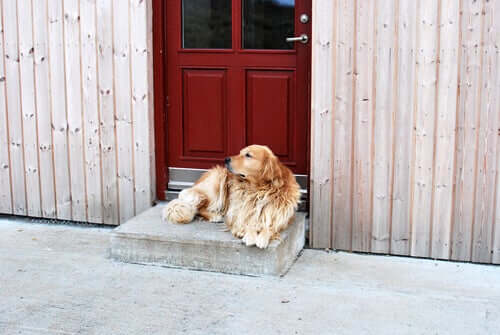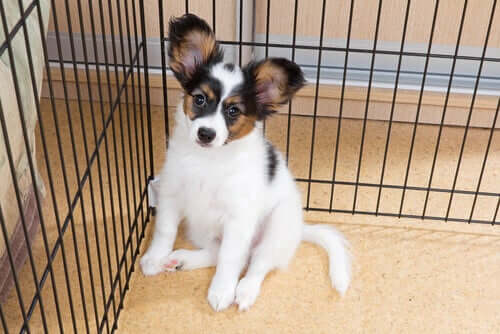What to Expect When Your Dog Returns Home from a Boarding Kennel


Written and verified by the lawyer Francisco María García
Some dogs tend to act differently after returning from vacation. They’re emotionally sad, discouraged, and with little energy. They can also be on the defensive. It’s very important to detect these changes when your dog returns home from a boarding kennel.
The holidays bring routine and habit changes with them. Rest and longer walks, visiting different places, meeting new people… Coming home after the holidays not only affects people. Dogs can also tell the difference.
Many people suffer when they return home after vacation. They may even have symptoms of depression or anxiety. This can also happen to dogs when they return home from a boarding kennel.
“Separation anxiety” is a fairly common symptom in dogs who return home from vacation. In addition, symptoms of aggressiveness, irritability, and melancholy can show in the animal. It takes a lot of gentleness and patience to deal with these issues.
Behavioral changes in dogs when they return home from a boarding kennel

The holidays are a period of enjoyment for everyone. It’s like routine didn’t exist and you feel that you can do whatever you want without any consequences. Going back to the usual routine after the holidays can be difficult, and even more so for dogs.
These are the most common behavioral changes in dogs after they return from vacation:
- Altered hygiene habits. Your dog won’t remember when or where it should relieve itself. Your dog is likely to soil your house or apartment. Therefore, you must teach your pet the hygiene habits they forgot during the holidays.
- Need for constant attention. During the holidays, some dogs are extremely pampered. When they return home, it’s normal for them to need attention, even more so than before.
- Excess energy. The holidays involve many activities such as tours, walks, games, and more. When your dog returns home, it’s normal for it to want to continue at the same pace.
- Sadness and lack of motivation. The holidays involve energy, dynamism, and fun. Back at home, it’s normal for your dog to feel sadness and a lack of motivation.
- Difficulty staying home alone. What was once really easy, is now almost impossible. Your dog might not bear being alone at home, if only for a few hours. It may bark, whine, moan, or throw a tantrum when faced with this situation.
- Aggressiveness. Your dog may behave aggressively. It may bite and break things. The anxiety caused by the time your dog was away from you may lead to uncommon behavior.
Other consequences
In addition to these behavior changes, your dog may also manifest mood swings. Your dog may not sleep at night, eat less than usual, and not want to go for a walk. If these attitude changes last for more than two weeks, you must take the animal to a veterinarian.
What may seem like just a simple vacation can bring about several consequences. Animals are like children; they need time and patience to adapt to new habits.
You have to be patient when it comes to helping your dog adapt once again to their home habits.
A few useful tips
- It’s important for your dog not to be alone when it returns home from a boarding kennel. The animal should be accompanied by someone most of the time.
- Your dog should enjoy their play times.
- Exercising will help your dog release endorphins, the “happiness hormone”.
- You’ll need to be really patient during this readjustment process.
- If your dog seems entirely different after coming home from a boarding kennel, you’ll need to take it to the vet. This will help you rule out any health problems.
Patience and gradual and progressive readjustment
Coming back from vacation generates anxiety and discouragement in many people and animals. Thus, it’s necessary to gradually incorporate everyday life habits again. After a few days, everything will return to normal, as if nothing had happened.

But visiting a boarding kennel can also be positive. Your dog may learn new and improved habits. It’ll be like starting from scratch. It’s a unique opportunity to bring about new and healthy behavior habits.
Some dogs tend to act differently after returning from vacation. They’re emotionally sad, discouraged, and with little energy. They can also be on the defensive. It’s very important to detect these changes when your dog returns home from a boarding kennel.
The holidays bring routine and habit changes with them. Rest and longer walks, visiting different places, meeting new people… Coming home after the holidays not only affects people. Dogs can also tell the difference.
Many people suffer when they return home after vacation. They may even have symptoms of depression or anxiety. This can also happen to dogs when they return home from a boarding kennel.
“Separation anxiety” is a fairly common symptom in dogs who return home from vacation. In addition, symptoms of aggressiveness, irritability, and melancholy can show in the animal. It takes a lot of gentleness and patience to deal with these issues.
Behavioral changes in dogs when they return home from a boarding kennel

The holidays are a period of enjoyment for everyone. It’s like routine didn’t exist and you feel that you can do whatever you want without any consequences. Going back to the usual routine after the holidays can be difficult, and even more so for dogs.
These are the most common behavioral changes in dogs after they return from vacation:
- Altered hygiene habits. Your dog won’t remember when or where it should relieve itself. Your dog is likely to soil your house or apartment. Therefore, you must teach your pet the hygiene habits they forgot during the holidays.
- Need for constant attention. During the holidays, some dogs are extremely pampered. When they return home, it’s normal for them to need attention, even more so than before.
- Excess energy. The holidays involve many activities such as tours, walks, games, and more. When your dog returns home, it’s normal for it to want to continue at the same pace.
- Sadness and lack of motivation. The holidays involve energy, dynamism, and fun. Back at home, it’s normal for your dog to feel sadness and a lack of motivation.
- Difficulty staying home alone. What was once really easy, is now almost impossible. Your dog might not bear being alone at home, if only for a few hours. It may bark, whine, moan, or throw a tantrum when faced with this situation.
- Aggressiveness. Your dog may behave aggressively. It may bite and break things. The anxiety caused by the time your dog was away from you may lead to uncommon behavior.
Other consequences
In addition to these behavior changes, your dog may also manifest mood swings. Your dog may not sleep at night, eat less than usual, and not want to go for a walk. If these attitude changes last for more than two weeks, you must take the animal to a veterinarian.
What may seem like just a simple vacation can bring about several consequences. Animals are like children; they need time and patience to adapt to new habits.
You have to be patient when it comes to helping your dog adapt once again to their home habits.
A few useful tips
- It’s important for your dog not to be alone when it returns home from a boarding kennel. The animal should be accompanied by someone most of the time.
- Your dog should enjoy their play times.
- Exercising will help your dog release endorphins, the “happiness hormone”.
- You’ll need to be really patient during this readjustment process.
- If your dog seems entirely different after coming home from a boarding kennel, you’ll need to take it to the vet. This will help you rule out any health problems.
Patience and gradual and progressive readjustment
Coming back from vacation generates anxiety and discouragement in many people and animals. Thus, it’s necessary to gradually incorporate everyday life habits again. After a few days, everything will return to normal, as if nothing had happened.

But visiting a boarding kennel can also be positive. Your dog may learn new and improved habits. It’ll be like starting from scratch. It’s a unique opportunity to bring about new and healthy behavior habits.
This text is provided for informational purposes only and does not replace consultation with a professional. If in doubt, consult your specialist.








